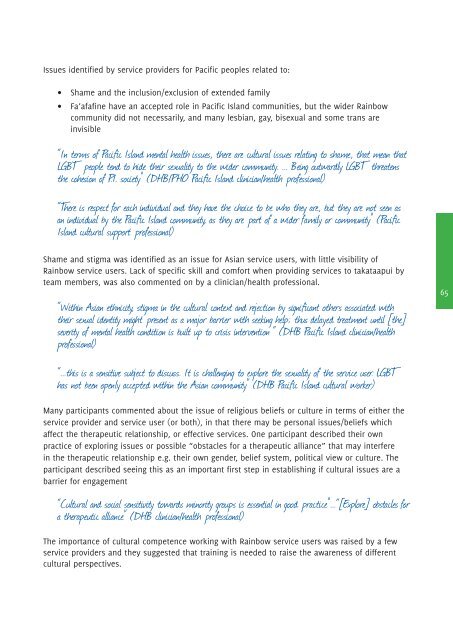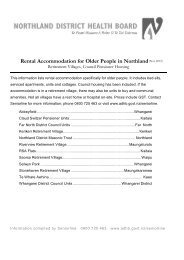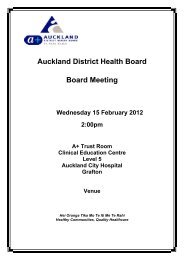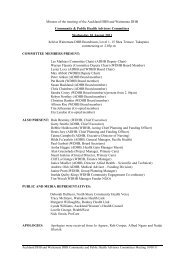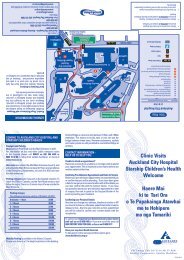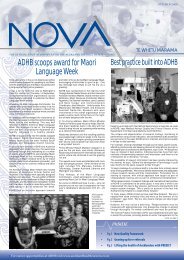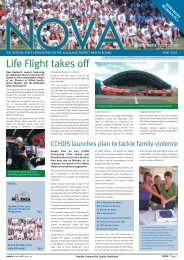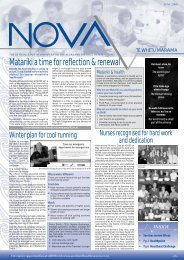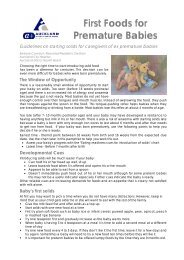Lets talk about sex.... - Auckland District Health Board
Lets talk about sex.... - Auckland District Health Board
Lets talk about sex.... - Auckland District Health Board
Create successful ePaper yourself
Turn your PDF publications into a flip-book with our unique Google optimized e-Paper software.
Issues identified by service providers for Pacific peoples related to:<br />
• Shame and the inclusion/exclusion of extended family<br />
• Fa’afafine have an accepted role in Pacific Island communities, but the wider Rainbow<br />
community did not necessarily, and many lesbian, gay, bi<strong>sex</strong>ual and some trans are<br />
invisible<br />
“In terms of Pacific Island mental health issues, there are cultural issues relating to shame, that mean that<br />
LGBT people tend to hide their <strong>sex</strong>uality to the wider community. ... Being outwardly LGBT threatens<br />
the cohesion of P.I. society” (DHB/PHO Pacific Island clinician/health professional)<br />
“There is respect for each individual and they have the choice to be who they are, but they are not seen as<br />
an individual by the Pacific Island community, as they are part of a wider family or community” (Pacific<br />
Island cultural support professional)<br />
Shame and stigma was identified as an issue for Asian service users, with little visibility of<br />
Rainbow service users. Lack of specific skill and comfort when providing services to takataapui by<br />
team members, was also commented on by a clinician/health professional.<br />
“Within Asian ethnicity, stigma in the cultural context and rejection by significant others associated with<br />
their <strong>sex</strong>ual identity might present as a major barrier with seeking help; thus delayed treatment until [the]<br />
severity of mental health condition is built up to crisis intervention “ (DHB Pacific Island clinician/health<br />
professional)<br />
“...this is a sensitive subject to discuss. It is challenging to explore the <strong>sex</strong>uality of the service user. LGBT<br />
has not been openly accepted within the Asian community” (DHB Pacific Island cultural worker)<br />
Many participants commented <strong>about</strong> the issue of religious beliefs or culture in terms of either the<br />
service provider and service user (or both), in that there may be personal issues/beliefs which<br />
affect the therapeutic relationship, or effective services. One participant described their own<br />
practice of exploring issues or possible “obstacles for a therapeutic alliance” that may interfere<br />
in the therapeutic relationship e.g. their own gender, belief system, political view or culture. The<br />
participant described seeing this as an important first step in establishing if cultural issues are a<br />
barrier for engagement<br />
“Cultural and social sensitivity towards minority groups is essential in good practice”...“[Explore] obstacles for<br />
a therapeutic alliance” (DHB clinician/health professional)<br />
The importance of cultural competence working with Rainbow service users was raised by a few<br />
service providers and they suggested that training is needed to raise the awareness of different<br />
cultural perspectives.<br />
65


